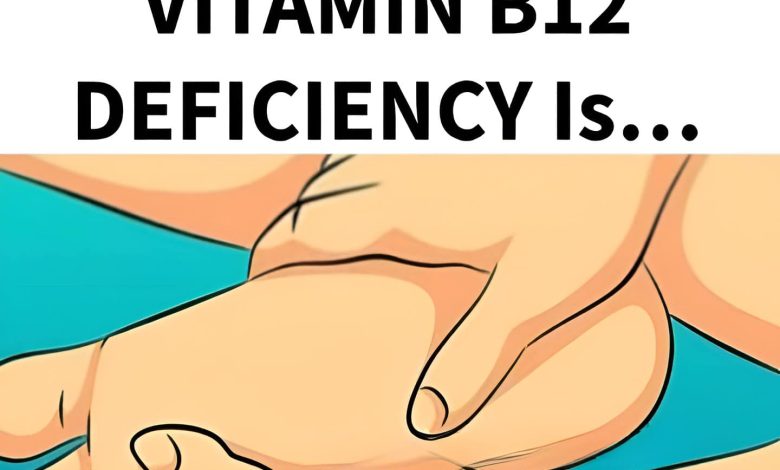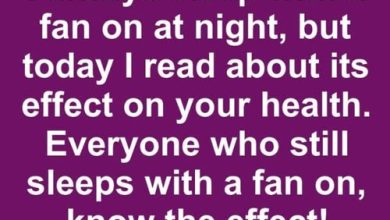Signs Of Vitamin B12 Deficiency You Should Never Ignore

Do you often find yourself grappling with persistent feelings of being “drained,” lacking motivation to tackle daily tasks, or experiencing moments of forgetfulness that seem beyond the occasional lapse? While it’s easy to attribute these feelings to a demanding lifestyle or simply “a bad day,” they could potentially be indicative of a more significant underlying issue: a deficiency in vitamin B12. This vital nutrient plays a fundamental role in your body’s ability to produce energy effectively and maintain overall health. However, the symptoms associated with a vitamin B12 deficiency can often be subtle and, as a result, are frequently overlooked or dismissed. From peculiar “tingling sensations” in your extremities to noticeable shifts in your mood, gaining a comprehensive understanding of these potential warning signs represents the crucial first step towards proactively managing your health and well-being.
ADVERTISEMENT
Delving Deeper into the Symptoms of Vitamin B12 Deficiency
ADVERTISEMENT
A deficiency in vitamin B12 can manifest itself through a surprisingly wide array of symptoms, and it’s important to recognize that these indicators aren’t always immediately obvious or easily linked to a nutritional imbalance. While common initial signs might include persistent “fatigue,” a persistent feeling of mental “brain fog” making concentration difficult, and a general “low mood,” the deficiency can also lead to a range of more pronounced physical and neurological issues. These can include:
ADVERTISEMENT
- The unsettling sensation of “tingling or numbness in the hands, feet, or legs.”
- Experiencing “difficulty walking or balance problems,” which can impact daily mobility and increase the risk of falls.
- Noticing “a swollen or inflamed tongue,” which can sometimes be accompanied by changes in taste or discomfort.
- The development of “jaundiced skin,” a yellowish discoloration that can indicate issues with red blood cell breakdown.
- In more severe cases, experiencing psychological symptoms such as “paranoia or hallucinations.”
- A general feeling of “weakness or anemia,” where the body lacks sufficient healthy red blood cells to carry adequate oxygen.
Given that vitamin B12 is critically involved in the proper functioning of our nerve system and the efficient production of red blood cells, it is imperative that these symptoms are not dismissed or “ignored.” Recognizing these potential indicators early can pave the way for timely intervention and help prevent more serious health complications from developing.
Why Vitamin B12 Holds Such Essential Importance for Our Bodies
“Vitamin B12 is a nutrient the body can’t produce on its own,” highlighting the fact that we are entirely reliant on external sources to obtain this crucial compound. This means that we must actively incorporate B12-rich foods into our diets or consider supplementation to meet our body’s needs. Vitamin B12 is particularly vital for several key bodily processes, including efficient “energy production,” the healthy “red blood cell formation” necessary for oxygen transport, and the maintenance of optimal “neurological health,” ensuring proper nerve function and communication throughout the body. Emerging “studies suggest that nearly 40% of North Americans are deficient in this essential vitamin,” underscoring the widespread nature of this nutritional concern. Furthermore, these studies indicate that “rates” of deficiency can be “even higher among those with conditions like Chronic Fatigue Syndrome or Fibromyalgia,” suggesting a potential link between B12 levels and these chronic health issues.
Understanding the Process of Testing for B12 Deficiency
Determining whether an individual has a vitamin B12 deficiency can sometimes be a more nuanced process than one might initially assume. While standard “serum B12 tests are commonly used,” these tests primarily measure the amount of B12 circulating in the blood and “don’t measure how well your body is utilizing the vitamin” at a cellular level. For a potentially “more accurate diagnosis,” it is advisable to “ask your doctor about an Intracellular B12 test,” which assesses the B12 levels within the body’s cells. If an intracellular test “is unavailable,” your healthcare provider may recommend additional “tests for Methylmalonic Acid (MMA) and Homocysteine levels,” as elevated levels of these substances can provide “additional insights” into a possible B12 deficiency, even if serum levels appear within the normal range.
Exploring the Various Factors That Can Lead to a B12 Deficiency
A deficiency in this vital nutrient can arise due to a variety of underlying factors, each impacting the body’s ability to absorb or utilize vitamin B12 effectively:
- Pernicious Anemia: This is “an autoimmune condition” where the body’s immune system mistakenly attacks and “damages stomach cells responsible for producing intrinsic factor,” a crucial “protein needed for B12 absorption.” “Without intrinsic factor, your body struggles to absorb B12 from food, leading to a deficiency.
- Leaky Gut Syndrome: Various “conditions that disrupt the gut lining,” such as sensitivities like “gluten sensitivity,” underlying “bacterial infections,” or a diet high in “excessive sugar intake,” “can impair your ability to absorb nutrients, including B12.” Proactively “addressing gut health through dietary changes can significantly improve absorption.”
- Poor Gut Microbiome: “An imbalance of gut bacteria can interfere with nutrient absorption.” To foster “a healthy microbiome,” it’s beneficial to “reduce sugar intake and increase probiotic-rich foods like yogurt, sauerkraut, and kefir.”
- Medications for Heartburn: “Many heartburn medications reduce stomach acid, which is essential for breaking down and absorbing B12.” If you’re experiencing “persistent heartburn,” it’s wise to “address the root cause rather than relying solely on medication” long-term.
- Chemotherapy Side Effects: “Chemotherapy treatments can damage the gut lining, making it harder for your body to absorb essential vitamins like B12 and folic acid.” In such cases, “high-quality supplements may help mitigate these effects,” but always under the guidance of your oncologist.
Dietary Strategies for Addressing Vitamin B12 Deficiency
“Dietary solutions for addressing a B12 deficiency primarily involve increasing your intake of animal-based foods, which are the richest sources of this essential nutrient.” Actively “incorporating options like wild-caught fish, free-range poultry, grass-fed beef, and organ meats such as liver can significantly boost your levels.” “For those following a vegetarian or vegan diet, fortified plant-based foods and high-quality supplements can help bridge the gap.” “Additionally, pairing B12-rich foods with a healthy gut microbiome can enhance absorption, making probiotic-rich options like yogurt, kefir, and fermented vegetables valuable additions to your diet.” By consciously “prioritizing nutrient-dense choices, you can combat deficiency and support optimal health.”
- “Eat More Meat”: As emphasized, “animal products are the richest sources of B12.” To naturally “boost your intake,” consciously “opt for wild-caught fish, grass-fed beef, and organ meats like liver.”
- “Consider Supplements”: “For vegetarians or those struggling to meet their B12 needs,” readily available “supplements like Methylcobalamin or Cyanocobalamin can be effective.” It is always recommended to “consult your healthcare provider to determine the right dosage” for your individual needs.
- “Focus on Probiotic Foods”: “A healthy gut promotes better nutrient absorption.” To gain “a natural boost,” actively “include fermented foods like kimchi, kombucha, and dark chocolate in your diet.”
- “Eliminate Inflammatory Foods”: “Cutting out processed foods, sugar, and gluten can improve gut health, enhancing your body’s ability to absorb B12 and other nutrients.” This can create a more favorable environment for nutrient uptake.
- “Try Desiccated Liver Supplements”: “If organ meats aren’t appealing,” convenient “desiccated liver capsules provide an excellent alternative for a natural source of B12.”
Conclusion: Empowering Yourself to Take Control of Your B12 Levels
“Vitamin B12 is essential for maintaining your energy, mood, and overall health.”
Proactively “recognizing the symptoms of deficiency and addressing them through diet, supplements, or medical care can make a significant difference in your well-being.” “Whether it’s eating more nutrient-rich foods, balancing your gut microbiome, or seeking professional guidance, taking steps to optimize your B12 levels is a simple yet powerful way to improve your health.” Don’t allow a potential deficiency to negatively impact your quality of life – “don’t let a deficiency hold you back—take action today!” By being informed and proactive, you can take meaningful steps towards ensuring you are getting enough of this vital nutrient and supporting your long-term health and vitality.




